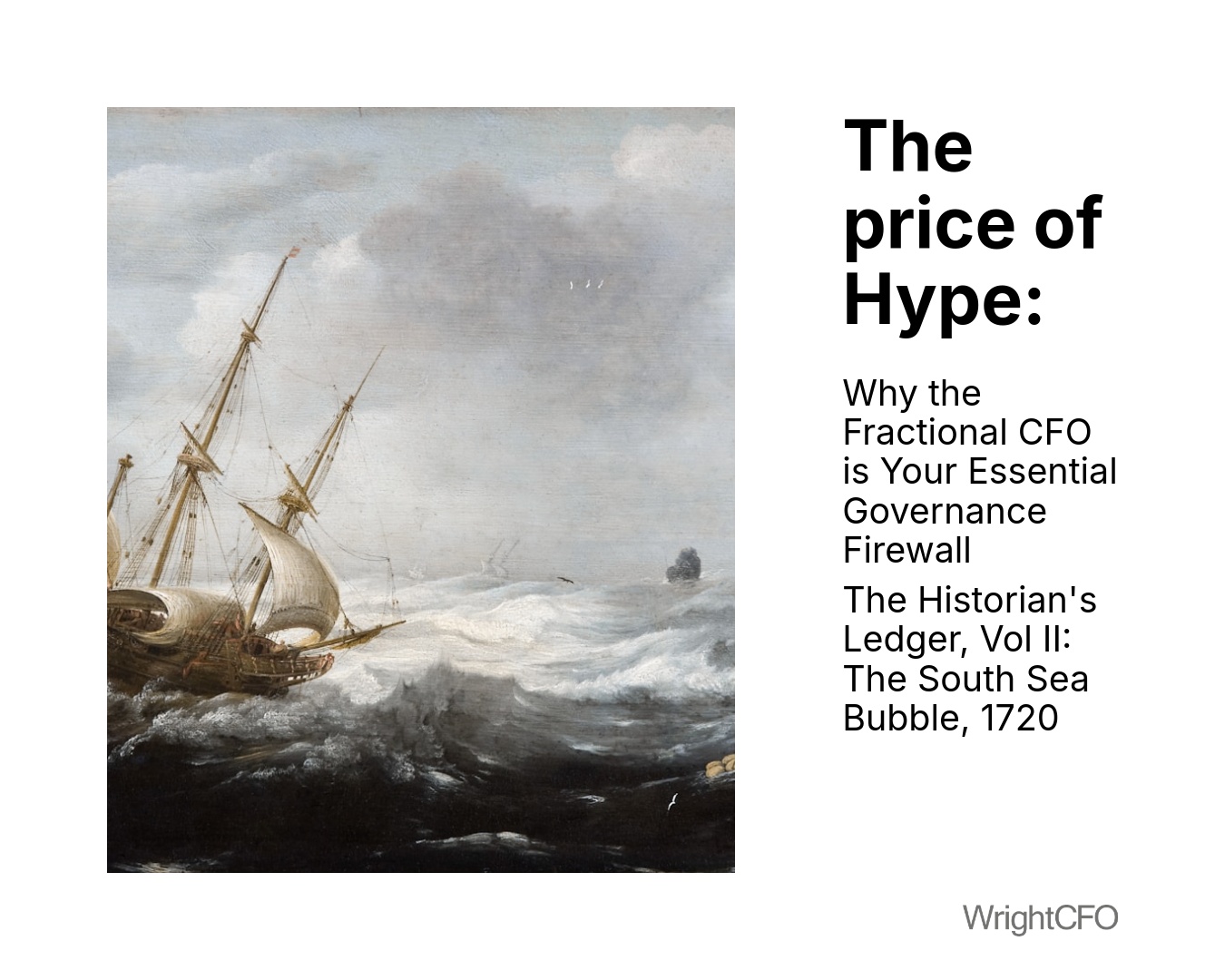The Price of Hype: Why the Fractional CFO is Your Essential Governance Firewall
The Historian’s Ledger, Vol. II: The South Sea Bubble, 1720
A Fractional CFO is more than a financial advisor, they are your modern-day governance firewall. If last week’s lesson from Constantinople was about the fatal cost of ignoring innovation, this week addresses something more corrosive: the catastrophic cost of dishonesty and greed in the boardroom.
We look back at a financial mania so scandalous it remains a byword for corporate chicanery: The South Sea Bubble of 1720.
The Architecture of Deceit: A Business Without Trade
To understand the 1720 collapse, you must understand the South Sea Company’s spectacular financial illusion.
The company was set up to perform a neat trick: it absorbed a large portion of the British national debt. It encouraged government creditors (those holding government IOUs) to swap their debt for shares in the company. In theory, the shareholders would reap immense dividends from a supposed monopoly on trade with South America.
But here is the crucial financial flaw: The company had virtually no profitable trade.
Its business model was not selling goods; it was selling the story of colonial riches, all underpinned by financial engineering. The company’s true health relied entirely on a self-sustaining cycle: selling shares to absorb more debt, which drove the share price higher, which attracted more speculative buyers.
The stock price, anchored to nothing but public frenzy, soared from to over by August. This entire operation was run by directors who were enriching themselves through insider dealing and using blatant propaganda to maintain the hype.
This isn’t just a historical anecdote; it’s a blueprint for a business where Hype is deliberately substituted for true financial value.
The Governance Vacuum: A Warning for Scale-ups
The most devastating failure wasn’t the public’s irrationality; it was the sheer governance vacuum that enabled the fraud. This is exactly the gap a Fractional CFO prevents, bringing external discipline and objective oversight when a business starts scaling fast. There were no independent controls, no external checks, and no objective financial oversight to challenge the management’s spectacular lies.
When your business is growing rapidly in the media or tech sectors, you face similar pressure:
- The temptation to inflate projections, or be creatively generous with the numbers, just to secure that next round of funding.
- The desire to allow internal management total freedom, without the objective, cold-eyed oversight required to maintain integrity.
The Bubble burst in September 1720. The price crashed back to earth, thousands were ruined, and a subsequent inquiry revealed the extent of the bribery and corruption at the highest levels. The lesson is simple: Financial governance is not a nice-to-have; it is the non-negotiable insurance policy against implosion.
The Fractional CFO: Your Integrity Policy
So, what is the modern antidote to the 1720 temptation?
It is the introduction of ruthless, objective, external financial oversight. This is precisely the role of a Fractional CFO. We are not just bookkeepers; we are your external governance firewall.
- The Independent Governor: We are not emotionally invested in the sales team’s hyperbole or the founder’s vision of ‘to the moon’. We are there to look at the unit economics and cash flow with unconflicted rigour.
- Transparency is Survival: We establish crystal-clear reporting structures. You cannot build a reputable, scaling business on financial ‘smoke and mirrors’; you need accounts that stand up to the most hostile scrutiny.
- Anchor to Value: We ensure your valuation is anchored in tangible, defensible assets and revenue models, keeping your feet firmly on the ground, even when speculators are promising the skies.
Don’t let your pursuit of growth allow a financial bubble to form beneath the surface of your organisation. Financial governance isn’t a bureaucratic chore; it is the only policy for long-term survival.
This article was originally published here on LinkedIN on October 13th, 2025.






